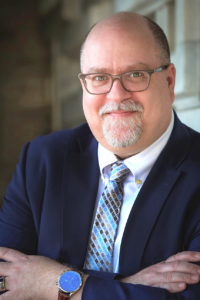HSC pharmacologist answers questions about potential COVID-19 treatments, vaccines
*Note: The technical terms for the novel coronavirus that is causing COVID-19 pneumonia are HCoV-19 or SARS-CoV-2. The virus has been referred to as coronavirus or COVID-19 in media reports.
 As cases of HCoV-19 infection and resultant COVID-19 pneumonia rise in the United States, so do questions about the process and timeline to develop effective treatments or vaccines to protect people. David Siderovski, PhD, HSC Professor and Chair of the Department of Pharmacology and Neuroscience, explains how the novel coronavirus HCoV-19 that causes COVID-19 pneumonia impacts the body, why we don’t yet have effective treatments, and what’s being done to create them.
As cases of HCoV-19 infection and resultant COVID-19 pneumonia rise in the United States, so do questions about the process and timeline to develop effective treatments or vaccines to protect people. David Siderovski, PhD, HSC Professor and Chair of the Department of Pharmacology and Neuroscience, explains how the novel coronavirus HCoV-19 that causes COVID-19 pneumonia impacts the body, why we don’t yet have effective treatments, and what’s being done to create them.
What does this novel coronavirus do to the body?
Coronaviruses are common and usually cause a mild illness of the nose, throat and sinuses that we know as the common cold. The novel coronavirus (called HCoV-19 or SARS-CoV-2) also enters and infects the lungs, and may lead to “COVID-19 pneumonia” that can be fatal to the elderly and people with serious underlying medical conditions. Infection with the HCoV-19 virus is thought to stimulate a “cytokine storm” — a self-amplifying release of danger messages and inflammation signals that leads to fluid buildup in the lungs, impaired absorption of oxygen, and sometimes a second infection of the lungs by bacteria or other foreign agents.
Why don’t we have effective treatments?
Viruses like HCoV-19 are not “alive” until they enter our cells and hijack their critical functions. Because of that, it is difficult to design a drug that only affects the workings of the virus as it reproduces, without also affecting our own cells’ machinery that sustains life. HCoV-19 is so new that scientists only recently got their first glimpse of its genetic blueprint, so it will take time to use this information to create candidate vaccines.
What is the process for approval of a treatment or vaccine?
We can look to some historical examples for a sense of how quickly a HCoV-19 treatment or vaccine could be approved. The antiviral medication known as “Tamiflu,” used to treat the flu caused by influenza viruses A and B, was invented and patented in 1996, and launched in North America three years later. On the other hand, an effective vaccine for the virus HIV-1 that causes Acquired Immune Deficiency Syndrome (AIDS) remains unidentified, even though we have known its genetic blueprint since the mid-1980s and despite many trials of many designs. For any HCoV-19 treatment, testing for safety in hundreds of people in Phase I and Phase II clinical trials and for efficacy in thousands of people in Phase II and Phase III trials, would have to occur before the U.S. Food and Drug Administration could vote to approve its use on American COVID-19 patients.
What is HSC doing?
Kunlin Jin, PhD, a HSC Department of Pharmacology and Neuroscience professor working with an international team of colleagues, recently published a report about success using stem cell transplantation to improve outcomes for Chinese patients with COVID-19 pneumonia. The team’s publication in the April 2020 issue of the Aging and Disease (http://www.aginganddisease.org/EN/10.14336/AD.2020.0228) describes how seven patients with COVID-19 pneumonia at the Beijing YouAn Hospital were given intravenous injections of mesenchymal stem cells isolated from umbilical cord blood. It’s believed that these stem cells can quiet the “cytokine storm” within patients with COVID-19 pneumonia. Lung function was significantly improved for these seven Chinese patients within two days after the stem cell transplantation, and three patients recovered and were discharged from the Chinese hospital 10 days after treatment. No adverse effects of the mesenchymal stem cell transplantation were identified in this early study.
About David Siderovski, PhD:
Before joining HSC this month, Dr. Siderovski worked in immune system-focused drug discovery at AMGEN Inc., and holds three patents from those efforts. In 2012, he was recruited to West Virginia University to chair a research task force addressing local responses to the opioid addiction crisis. More information can be found on his Wikipedia page: https://en.wikipedia.org/wiki/David_Siderovski





Social media